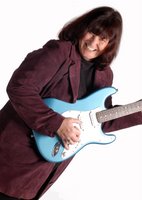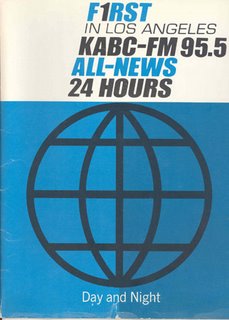Listening In
April 28, 2006
By Sandy Wells
KLOS PD finds room to grow playlist in post Arrow 93 world
Arrow 93 world

A year after the sign-off of Arrow 93 (KCBS-FM 93.1) and its rebirth as Jack FM its KLOS-FM 95.5 is seeing the light.
(left) KLOS Midday DJ Cynthia Fox, (right) KLOS Program Director Rita Wilde
April 28, 2006
By Sandy Wells
KLOS PD finds room to grow playlist in post
 Arrow 93 world
Arrow 93 world 
A year after the sign-off of Arrow 93 (KCBS-FM 93.1) and its rebirth as Jack FM its KLOS-FM 95.5 is seeing the light.
(left) KLOS Midday DJ Cynthia Fox, (right) KLOS Program Director Rita Wilde
KLOS Program Director Rita Wilde says it’s not just her station that is letting the sun shine in. Other station programmers in LA are feeling safe to come out from hiding and bask in expanded music playlists.
Perhaps the “Dark Ages” of pop/rock music radio are over.
Wilde says KLOS has doubled its offering of classic rock songs over the last year, moving from about 400 “in rotation” to about 800.
“With Arrow, it was always neck and neck. We shared about 60 percent of our playlist with them,” says Wilde about the cut-throat competition in which neither station could afford to let down its guard and playother than very well-tested album cuts.
“It’s rare in a market to have two classic rockers go head to head for so long,” observed Wilde.
Although the factors that went into Infinity Radio’s (now CBS) conversion of Arrow to Jack are open to some speculation, Wilde believes that Arrow 93 made a fatal error when it went head to head against KLOS’s long-running Mark and Brian Show with Jonathan Brandmeier.
It was the second go around for the Chicago personality in Los Angeles. He had a stint as a midday host on talker KLSX-FM 97.1. Another effort to match Mark and Brian failed when the Seattle-based Bob Rivers lasted just 11 days.
But now with Jack, the expanded playlist genie seems to be out of the bottle and that is really improving the sound of commercial radio generally.
Wilde says she sees other stations in the market, such as top 40 KIIS-FM 102.7, oldies KRTH-FM 101.1 and KYSR-FM 98.7 all increasing the number and variety of songs.
“I think it’s healthy,” she says. “We’ve probably doubled our playlist. We have a huge heritage and catalogue.”
KLOS has added an 8 a.m. Sunday show called “The Deep End.” Nick Michaels, who does the vocal imaging for the station, does his best to exploit the station’s vast collection of album rock from the late 60s and 70s.
“When was the last time you heard ‘Heard it in a Love Song’ by the Marshall Tucker Band?” says Wilde about one of the cuts Michaels aired recently. I couldn’t think of any time recently, as I attempted to scan my memories of listening to the radio since the song’s release in 1977.
Wilde has been kicking around the idea of creating a new slogan for KLOS: “Who Needs Jack When You Have Jim?”
She means Jim Ladd, the nightly 10 p.m. to 2 a.m. host who is allowed by virtue of his proven ear for programming and his late night hours, greater leeway in picking his own music.
Cynthia Fox features “deeper cuts” (less-well known by popular artists) In Tune at noon. Uncle Joe Benson has a regular afternoon feature “The Vault” out of which recently emerged another classic rock gem, “Maggie’s Farm” by Bob Dylan.
It’s obviously no secret that with millions of dollars of ad revenue pegged to the capriciousness of audience surveys and Arbitron’s quarterly ratings reports, nothing is just slipped into the CD player. Everything is tested and everything seems untried is a potential risk. It is music radio’s cross to bear, the legacy of decades of success.
Right now, Wilde is busy getting ready to launch KLOS’ HD station, “Fusion Rock,” which will be the first bilingual rock format.
“I’m really excited about it,” says Wilde about the preparations for the new channel aimed at specially-equipped HD radios. “We all have memories of college radio working 20 hours a day – never getting tired – because we love it and we are excited. There are no rules.”
Spanish-language artists such as Mana, Jaguares and Ozomatli will take their place alongside well-known Anglo bands such as AC/DC and Metallica.
“Santana opened for Mana a few years ago at Arrowhead Pond. People were singing along with Mana,” said Wilde. “I’d never heard them played on any stations. Spanish rock bands are not that exposed. I think it will be unique to (air them on Fusion Rock).”
Wilde, who is in her 23rd year with the station, is optimistic about the purchase of KLOS and other Disney-owned radio outlets by Citadel this year.
“I’m looking forward to it. We have a chance now to really reinvent radio. Citadel people are really very passionate about radio, as I am. I’m not scared at all. I welcome the change.”
KLOS prehistory: LA’s first all-news station
KLOS has been banging out rock tunes since 1969. Before that, KLOS was licensed as KABC-FM and simulcast with sister station KABC-AM 790. In 1967, the FCC required FM stations co-owned with an AM sister station to broadcast at least 50 percent original progra mming. In 1968, LA’s first 24/7 news radio station was launched. All-news KABC-FM relied heavily on the resources of the ABC Radio Network to fill the day. Following the launch of news stations KFWB-AM 980 and KNX-AM 1070 later that year on the still-dominant AM band, KABC management decided to cash in on the growing popularity of FM “underground rock” and KABC-FM was reborn as KLOS-FM.
mming. In 1968, LA’s first 24/7 news radio station was launched. All-news KABC-FM relied heavily on the resources of the ABC Radio Network to fill the day. Following the launch of news stations KFWB-AM 980 and KNX-AM 1070 later that year on the still-dominant AM band, KABC management decided to cash in on the growing popularity of FM “underground rock” and KABC-FM was reborn as KLOS-FM.
Perhaps the “Dark Ages” of pop/rock music radio are over.
Wilde says KLOS has doubled its offering of classic rock songs over the last year, moving from about 400 “in rotation” to about 800.
“With Arrow, it was always neck and neck. We shared about 60 percent of our playlist with them,” says Wilde about the cut-throat competition in which neither station could afford to let down its guard and playother than very well-tested album cuts.
“It’s rare in a market to have two classic rockers go head to head for so long,” observed Wilde.
Although the factors that went into Infinity Radio’s (now CBS) conversion of Arrow to Jack are open to some speculation, Wilde believes that Arrow 93 made a fatal error when it went head to head against KLOS’s long-running Mark and Brian Show with Jonathan Brandmeier.
It was the second go around for the Chicago personality in Los Angeles. He had a stint as a midday host on talker KLSX-FM 97.1. Another effort to match Mark and Brian failed when the Seattle-based Bob Rivers lasted just 11 days.
But now with Jack, the expanded playlist genie seems to be out of the bottle and that is really improving the sound of commercial radio generally.
Wilde says she sees other stations in the market, such as top 40 KIIS-FM 102.7, oldies KRTH-FM 101.1 and KYSR-FM 98.7 all increasing the number and variety of songs.
“I think it’s healthy,” she says. “We’ve probably doubled our playlist. We have a huge heritage and catalogue.”
KLOS has added an 8 a.m. Sunday show called “The Deep End.” Nick Michaels, who does the vocal imaging for the station, does his best to exploit the station’s vast collection of album rock from the late 60s and 70s.
“When was the last time you heard ‘Heard it in a Love Song’ by the Marshall Tucker Band?” says Wilde about one of the cuts Michaels aired recently. I couldn’t think of any time recently, as I attempted to scan my memories of listening to the radio since the song’s release in 1977.
Wilde has been kicking around the idea of creating a new slogan for KLOS: “Who Needs Jack When You Have Jim?”
She means Jim Ladd, the nightly 10 p.m. to 2 a.m. host who is allowed by virtue of his proven ear for programming and his late night hours, greater leeway in picking his own music.
Cynthia Fox features “deeper cuts” (less-well known by popular artists) In Tune at noon. Uncle Joe Benson has a regular afternoon feature “The Vault” out of which recently emerged another classic rock gem, “Maggie’s Farm” by Bob Dylan.
It’s obviously no secret that with millions of dollars of ad revenue pegged to the capriciousness of audience surveys and Arbitron’s quarterly ratings reports, nothing is just slipped into the CD player. Everything is tested and everything seems untried is a potential risk. It is music radio’s cross to bear, the legacy of decades of success.
Right now, Wilde is busy getting ready to launch KLOS’ HD station, “Fusion Rock,” which will be the first bilingual rock format.
“I’m really excited about it,” says Wilde about the preparations for the new channel aimed at specially-equipped HD radios. “We all have memories of college radio working 20 hours a day – never getting tired – because we love it and we are excited. There are no rules.”
Spanish-language artists such as Mana, Jaguares and Ozomatli will take their place alongside well-known Anglo bands such as AC/DC and Metallica.
“Santana opened for Mana a few years ago at Arrowhead Pond. People were singing along with Mana,” said Wilde. “I’d never heard them played on any stations. Spanish rock bands are not that exposed. I think it will be unique to (air them on Fusion Rock).”
Wilde, who is in her 23rd year with the station, is optimistic about the purchase of KLOS and other Disney-owned radio outlets by Citadel this year.
“I’m looking forward to it. We have a chance now to really reinvent radio. Citadel people are really very passionate about radio, as I am. I’m not scared at all. I welcome the change.”
KLOS prehistory: LA’s first all-news station
KLOS has been banging out rock tunes since 1969. Before that, KLOS was licensed as KABC-FM and simulcast with sister station KABC-AM 790. In 1967, the FCC required FM stations co-owned with an AM sister station to broadcast at least 50 percent original progra
 mming. In 1968, LA’s first 24/7 news radio station was launched. All-news KABC-FM relied heavily on the resources of the ABC Radio Network to fill the day. Following the launch of news stations KFWB-AM 980 and KNX-AM 1070 later that year on the still-dominant AM band, KABC management decided to cash in on the growing popularity of FM “underground rock” and KABC-FM was reborn as KLOS-FM.
mming. In 1968, LA’s first 24/7 news radio station was launched. All-news KABC-FM relied heavily on the resources of the ABC Radio Network to fill the day. Following the launch of news stations KFWB-AM 980 and KNX-AM 1070 later that year on the still-dominant AM band, KABC management decided to cash in on the growing popularity of FM “underground rock” and KABC-FM was reborn as KLOS-FM.
No comments:
Post a Comment